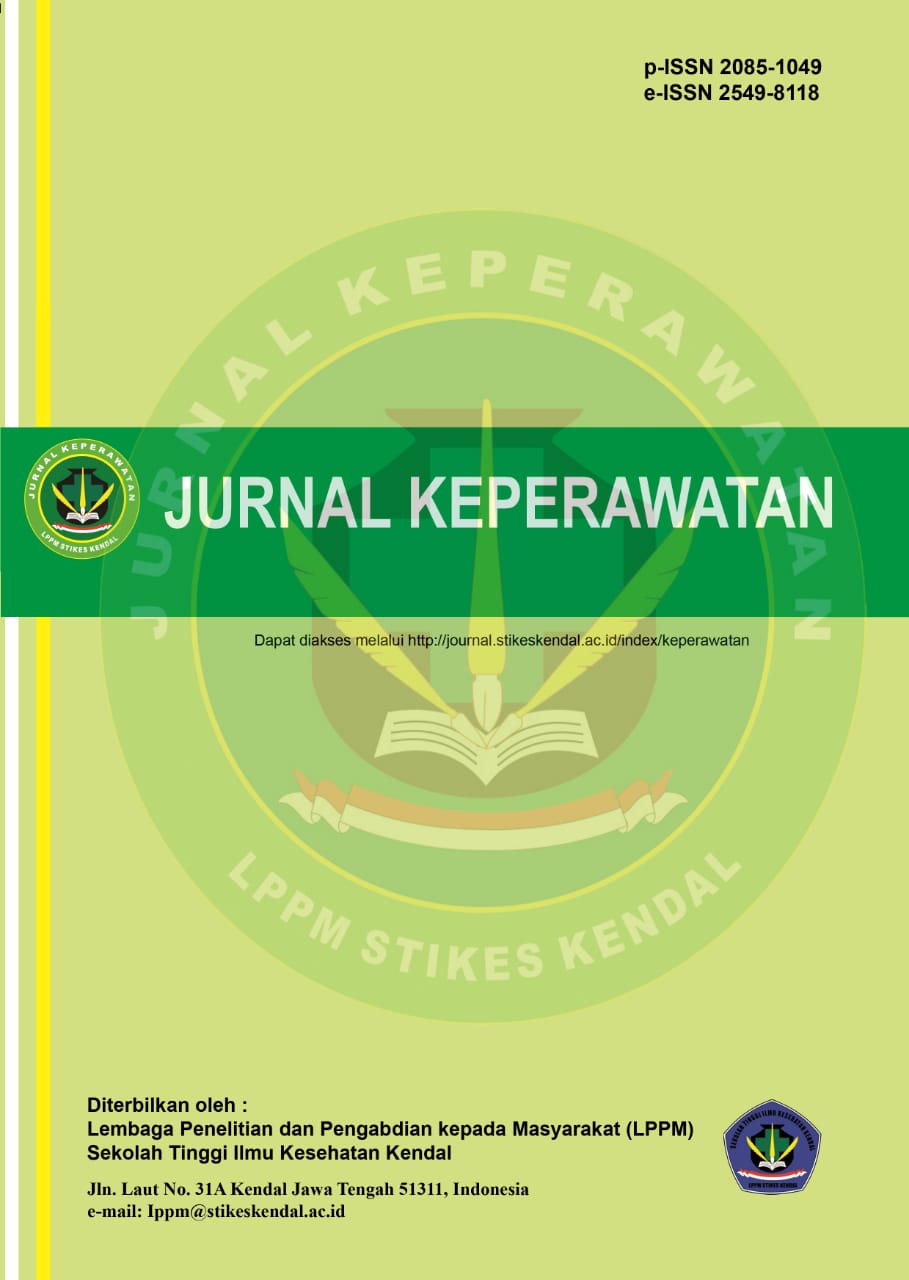Therapeutic Precence Perawat dalam Pengendalian Kecemasan pada Klien Pre Operasi
DOI:
https://doi.org/10.32583/keperawatan.v15i4.1279Keywords:
kecemasan pre operasi, klien, theurapetic presenceAbstract
Kecemasan pada klien yang akan mengalami preoperasi disebabkan oleh beberapa factor diantaranya adalah kondisi psikologis, dan juga prosedur pembedahan yang kurang dipahami. Therapeutic presence (kehadiran terapeutik) adalah fundamental yang mendasari kualitas dari hubungan terapeutik dan terapi yang efektif. Theraupetic presence perawat mencakup beberapa unsur bagian yaitu kehadiran fisik, kehadiran psikologis dan kehadiran teraupetik. Tujuan studi ini guna mengetahui dampak therapeutic presence perawat terhadap kondisi kecemasan pasien pre operasi. Penelitian ini jenis preeksperimental design dengan pre post test. Pengambilan sampel pada pasien yang akan dilakukan Tindakan operasi berusia 18-70 tahun di bangsal bedah RSUD Wonosari. Hasil : terdapat 20 responden laki-laki dan 21 wanita. Hasil menunjukkan tingkat rata-rata pre operasi adalah cemas sedang dan setelah dilakukan intervensi therapeutic presence menjadi cemas ringan. Hasil uji Analisa bivariat menunjukkan bahwa intervensi therapeutic presence berdampak dalam penurunan tingkat kecemasan dengan hasil uji P=0,000. Terdapat pengaruh therapeutic presence terhadap pengendalian kecemasan klien pre operasi.
References
Ay AA, Ulucanlar H, Ay A, Ozden. (2014). Risk factors for perioperative anxiety in laparoscopic surgery. M. JSLS: 18
Chekol YL, Basu.(2020). Global prevalence and determinants of preoperative anxiety among surgical patients: a systematic review and meta-analysis. Abate SM, B. Int J S Open. 2020;25:6–16
Deborah. Ellison. Cynthia K. Meyer. (2020). Presence and Therapeutic Listening Author links open overlay panel . Nursing Clinics of North America : Volume 55 Issue 4 : 457 -465
Ellison DL, Meyer CK. (2020). Presence and therapeutic listening. Nurs Clin North Am. ;55(4):457–465
Florance Ling Xiu. Newton Timothy J. Jones M Elinor. (2023). Cunningham. Social support and pre-operative anxiety in patients undergoing elective surgical procedures: A systematic review and meta-analysis . Journal Health Psychology. Mar; 28(4): 309 -327
Foroozan Atashzadeh. Soroor Parvizy. Meimanat Hosseini. (2022). Developing and validating the nursing presence scale for hospitalized patients. BMC Nursing.
Garvin, (2003). Assessment Of Patients’Anxiet. American journal of critical care.Available from: http;//ajcc.aacnjournal.org. Akkses pada tanggl 12 Desember 2022.
Geller, S. M. (2001). Therapists’ Presence: The development of a model and a measure. Unpublished doctoral dissertation, York University: Toronto, Canada
Hawari, D (2011) Manajemen Stres, Cemas dan Depresi, FKUI, Jakarta.
Helms LJ . 2020. Video education to improve preoperative anxiety in the bariatric surgical patient: a quality improvement project.. J Perianesth Nurs. ;35:467–471.
Journal Watson, J. (2007). Watson’s theory of human caring and subjective living experiences: carative factors/ caritas processes as a disciplinary guide to the professional nursing practice. Danish Clinical Nursing.
Kassahun WT, Mehdorn M, Wagner TC, Babel J, Danker H, Gockel I . (2022). The effect of preoperative patient-reported anxiety on morbidity and mortality outcomes in patients undergoing major general surgery.. Sci Rep;12:6312
Kozier. (2017). Fundamental Keperawatan Konsep Proses Dan Praktek. EGC. Jakarta
Levis Johana. Davis Sarah. Ren Shiejie. Hamilton Jen. (2020). Behavioural modification interventions for medically unexplained symptoms in primary care: systematic reviews and economic evaluation. Health Technol Assess. Sep;24(46):1-490. doi: 10.3310/hta24460.
Mulugeta H, Ayana M, Sintayehu M, Dessie G, Zewdu T . (2018). Preoperative anxiety and associated factors among adult surgical patients in Debre Markos and Felege Hiwot referral hospitals, Northwest Ethiopia.. BMC Anesthesiol. 18:155.
Parse RR. (2019). Nurses and person-centered care. Nurs Sci Q. ;32(4):265. doi: 10.1177/0894318419864335.
Perdana, A., M. F. Firdaus, dan C. Kapuangan. (2015). Uji validasi konstruksi dan reliabilitas instrumen the amsterdam preoperative anxiety and information scale ( apais ) versi indonesia construct validity and reliability of the amsterdam preoperative anxiety and information scale ( apais ) indonesian versi. Anesthesia & Critical Care. 31(1):279–286.
Polit DF, Beck CT. (2020). Nursing Research Generating and Assessing Evidence for Nursing Practice. 11. New York: Lippincott Williams & Wilkins USA;
Potter,A&G. Perry. (2005). Fundamental of Nursing. Seventh edision. Singapore:
Profil RSUD Wonosari. (2021). Pemerintah Kabupaten Gunung Kidul RSUD Wonosari
Riskesdas. (2018). Riset Kesehatan Dasar 2018. Kementrian Kesehatan Republik Indonesia.
Sawitri. (2008). Pengaruh Pemberian Informasi pra bedah terhadap tingkat kecemasan pada pasien pra bedah mayor di bangsal othopedi RSUI Kustati Surakarta
Sepriani N. (2017). Hubungan Perilaku Caring Perawat dengan Tingkat Kecemasan Pasien PreOperasi di Ruang Bedah RSUD Panembahan Senopati Bantul. Skripsi. Sekolah Tinggi Ilmu Kesehatan Jendral Ahmad Yani. Jogjakarta.
Wulandari Siswi. Viridula Yunicha E. Purnani Tri W. Yulinda Raras. (2023). Effectiveness of Preoperating Teaching with Anxiety Levels in Preoperating Sectio Caesarea Patients Journal for Quality for Public Health. Vol (6) No 2.
World Health Organization. (2017). Depression and other common mental disorders: global health estimates (No. WHO/MSD/MER/2017.2). World Health Organization.
Downloads
Published
How to Cite
Issue
Section
License
Copyright (c) 2023 Jurnal Keperawatan

This work is licensed under a Creative Commons Attribution-NonCommercial-NoDerivatives 4.0 International License.




